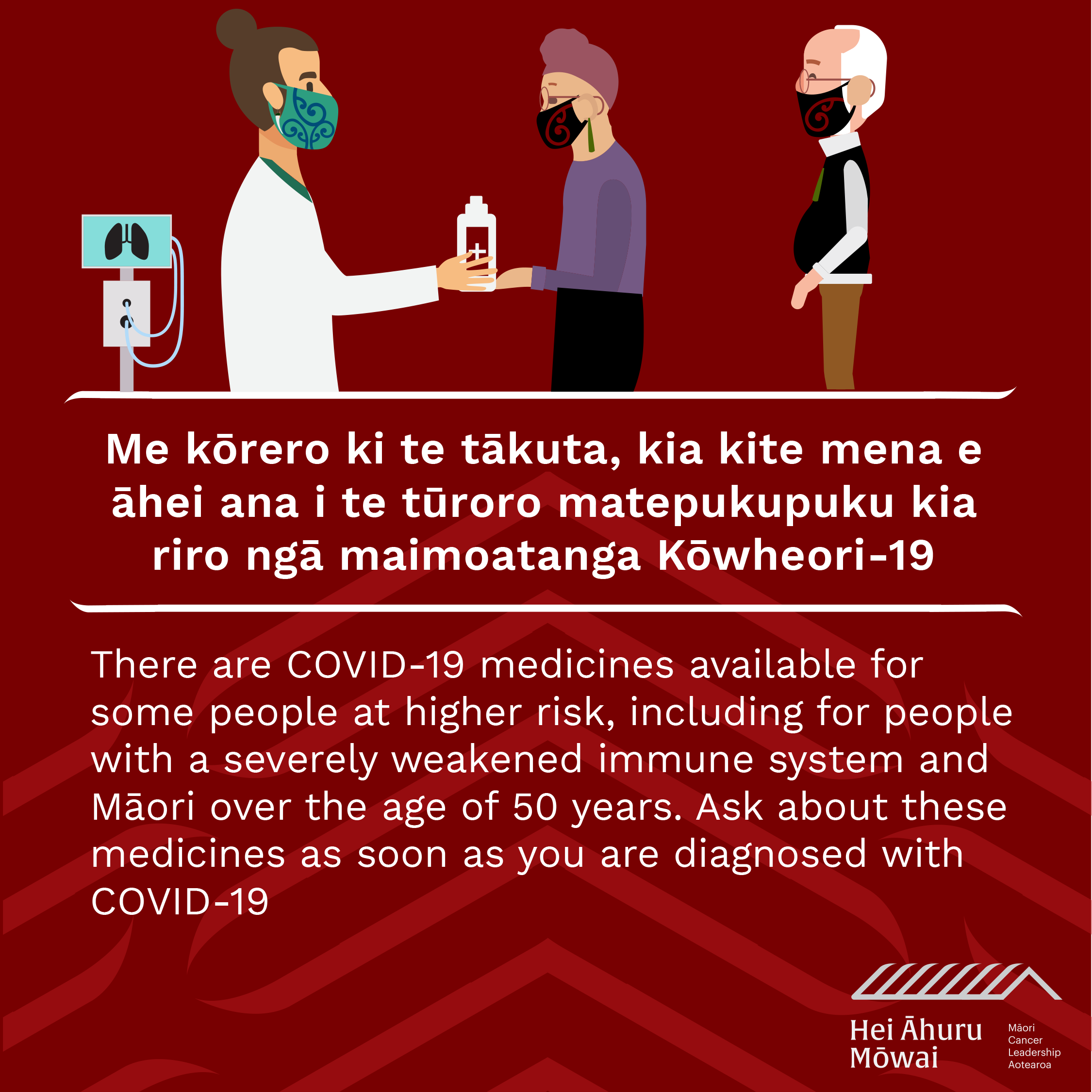People with cancer are at an increased risk of getting COVID-19 and have a greater risk of serious infection if they do get COVID-19.
Te Mate Pukupuku me te Mate Korona
Cancer during COVID-19
COVID-19 information for patients and whānau with cancer.
Hei Āhuru Mōwai, Māori Cancer Leadership Aotearoa worked with Te Aho o Te Kahu and the Cancer Society to produce COVID-19 information for whānau with cancer.
Information for whare (households) with cancer while COVID-19 is in the community (PDF 157 KB)
More Te Reo Māori COVID-19 information is also available in the translations section of the COVID-19 website.
You can find information on how to book vaccine boosters and common questions on managing COVID-19 and cancer treatment further down this page.
Guidance for clinicians and the COVID-19 Cancer Services Monitoring Reports can be found HERE.

Links to further COVID-19 information and how to book vaccine boosters
The best source of accurate and up-to-date information is available on the Unite against COVID-19 website.
Many conditions and treatments can weaken a person's immune system including:
- having chemotherapy or radiotherapy
- bone marrow or organ transplantation
- some blood cancers.
Having these conditions and treatments can mean you are at a higher risk of severe illness from COVID-19. Information for people at higher risk can be found on the COVID-19 website's prepare and stay safe section.
More information on who is considered at risk and what can be done to manage that risk can be found on the Ministry of Health's webpage for people at higher risk.
There are some simple steps to protect against COVID-19:
- Get vaccinated (including having your booster when it is due)
- Wear a face mask
- Keep your distance from other people in public
- Wash your hands regularly
- Sneeze and cough into your elbow
- If you are sick stay at home and call your cancer centre
- If you are sick with COVID-19 symptoms ring your doctor or Healthline (remember to let them know you are a cancer patient).
If you get a positive COVID-19 test result you should isolate at home and let your doctor know.
It is also important that you also look after your mental wellbeing.
COVID-19 vaccine boosters
Additional COVID-19 booster doses continue to be available for people who are eligible. This includes people aged 30 and older, and those aged 16 to 29 who are pregnant or are at higher risk of severe illness from COVID-19.
If you are eligible, you can receive an additional COVID-19 booster dose, regardless of how many doses you had previously. You need to wait six months between doses, and it’s recommended that you wait six months after your last COVID-19 infection.
For those who are already up to date with COVID-19 boosters, the people who are most likely to benefit from another COVID-19 booster in late 2023 include:
- Anyone aged 75 and older
- Māori and Pacific people aged 65 and older
- People aged 30 to 74 with significant complex health needs
- People aged 16 and older who are severely immunocompromised.
You can book an appointment by visiting bookmyvaccine.nz(https://bookmyvaccine.health.nz/), checking Healthpoint(https://www.healthpoint.co.nz/) for vaccination locations near you, or by talking to your doctor, pharmacist or hauora provider.
Before a COVID-19 vaccine can be administered in New Zealand it must be approved by MedSafe. This provides assurance of its safety, quality and effectiveness. Information about the COVID-19 vaccines in general can be found here.
Below are the answers to some frequently asked questions about the COVID-19 vaccine for whānau affected by cancer.
The general information on side-effects from the COVID-19 vaccine can be found here. There is no evidence that people with cancer experience different or worse side effects than the general population.
Yes. Talk to your cancer doctor, as depending on what treatment you are on, they may want to time the vaccine to be delivered at a certain point in your treatment cycle.
There is not currently any evidence to suggest that the COVID-19 vaccine interacts with cancer treatments. Decisions around timing of the vaccine are about maximising how effective the vaccine is, rather than concerns around how it will interact with cancer treatments.
If you have finished your cancer treatment and have been discharged from your hospital specialist, you should get the vaccine when it is offered to you. If you have any concerns you can discuss these with your GP.
We recommend that you talk to your cancer doctor if you have questions or concerns. If you have been discharged from hospital services, we recommend you talk to your GP if you have questions or concerns.
These can be downloaded here: Frequently Asked Questions about the COVID-19 vaccine and cancer (Word 53 KB)
Frequently Asked Questions about the COVID-19 vaccine and cancer (PDF 98 KB)
Content last updated 31 October 2023

